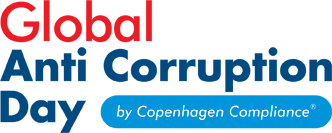WHY SHOULD COMPANIES CARE ABOUT AN ETHICAL BRIBERY AND CORRUPTION WORK CULTURE?
At the 2024 Annual Dialogue on Bribery and Corruption, on the 11th December 2024, we examine the critical role of ethical leadership and culture in achieving a global ESG agenda and embedding a holistic approach to risk and compliance processes and activities. Unethical behaviour presents a clear risk to the image and reputation of the organisation and its sustainability. But, equally, there are clear benefits to adopting an Ethical Culture.
The 2023 Global Anti Bribery and Corruption Day explores in detail the need to redesign and sustain an anti-Fraud and ethics culture within an organisation, working with management to encourage ethical behaviour.
- The benefits of an enhanced reputation and reduced risk of scandal
- Greater trust from shareholders that their investments are being managed with integrity
- Greater customer trust and satisfaction
- Less chance of fines, trade restrictions and prosecution
- Reduced bribery, fraud and corruption expense
- Less management time handling FCPA and UK A reports and issues.
Handling complicated legal challenges
In this rapidly evolving and complex business environment, where Anti-Bribery Convention and Bribery Act laws are substantial, internal audits, compliance and legal departments are not only required to maintain business integrity through effective fraud and corruption prevention strategy.
They need to implement these strategies in a meaningful way that goes beyond theory and positively impacts their company, employees and business partners.
The conference focuses on supporting an ethical business culture, mitigating fraud risk and handling complicated legal challenges. Ethics training and successful fraud prevention are authentic pillars.
What are the legal challenges are abundant: interviewing and pursuing employees, dealing with data protection and labour laws, and BA, FCPA. OECD and other anti-corruption compliance mandates.
Particular focus is necessary for third parties, including vendors, partners and joint ventures. Therefore it is vital to empower your company’s compliance department and improve your audit and compliance frameworks.
Focus on prevention and an effective investigations strategy: interviewing, whistleblowing, evidence gathering and prosecution.
Audit, risk, compliance and legal must embrace innovation to provide an integrated barrier against fraud and corruption for the organisation. The Corporate Investigation Guidelines for Investigation Teams
- How to develop and deliver a breakdown of what policies, guidelines, and processes must be in place to lead innovation in their corporate environments. Utilise this event to learn from their experiences, compare solutions and take away concrete strategies that you can use to drive transformation in your enterprise.
The anti-corruption obligations are part of the regulatory compliance; however, a growing number of Environmental, Social and Governance (ESG) obligations are incorporated into legal mandates.
The EU legislation to introduce mandatory due diligence concerning human rights and the environment,
The ESG agenda is a pressure point for an integrated approach.
All companies must recognise that a corporation’s governance framework, compliance culture, and remediation efforts are relevant factors in determining whether prosecuting a self-reporting corporation is in the public interest.
At the event, you get structured advice that will reflect on applying the guidelines over the past years to provide a regulatory perspective on how companies can promote good governance and strong compliance cultures and respond to anti-bribery incidents.
- We will examine the vital role of ethical leadership and culture in achieving an ESG agenda and embedding a holistic approach to risk and compliance.
Stakeholder expectations are framed through the lens of an ESG agenda. We will talk about the evolving implementation of this agenda by crucial corporate stakeholders, including investors, particularly concerning integrity (governance) and human rights (social).
‘Gold standard’ procedures to prevent bribery
The interconnectedness of corruption and human rights issues has increased visibility during the pandemic, with opaque supply chains heightening the risk of human rights abuses and corruption. In addition, there is growing international momentum from businesses and institutions to acknowledge the intersections between anti-corruption and human rights agendas and embed human rights in anti-corruption efforts. This session explores how human rights and corruption are mutually reinforcing and must be addressed in parallel.
Case study
A hypothetical case study will be presented, highlighting the need for adequate procedures to prevent bribery and mitigate human rights risks. This case study forms the basis of the workshop, giving participants practical insights into developing a holistic approach to compliance that addresses corruption, bribery and human rights. Based on case studies, we will evaluate and address the procedures and gaps and examine what measures must be implemented to establish ‘gold standard’ adequate procedures to prevent bribery.
More significant attraction and higher retention of ethical employees and top human talent who wish to be associated with an ethical organisation, thus resulting in improved productivity due to Improved risk management, Less risk of supply chain issues, improved performance and bottom line, Improved sustainability.
Adopting a zero-tolerance policy toward fraud, theft, corruption, and illegal behaviour
Taking appropriate disciplinary action;
- Providing a confidential internal helpline and a confidential external whistleblowing line
- Promoting an anonymous tip-offs line run externally with rewards for information which leads to successful prevention of fraud, theft, corruption or illegal behaviour
- Undertake ethics research via staff culture and values survey to set a benchmark for ethics awareness against improvement targets
- Establishing an Ethics Office/Ethics Officer to manage the internal ethics programme and empower managers at all levels to integrate ethics in their day-to-day actions and behaviour
- How to setup A Board Ethics Committee
- Moderating Anti Corruption blogs and ethics chats on intranets with practical examples of what is acceptable and what is not good behaviour
- Celebrating local organisational heroes who demonstrate ethical behaviour
Register today: https://www.copenhagencompliance.com/anti-corruption-day-2023/


